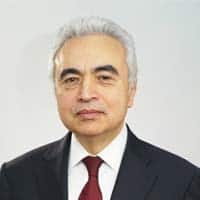Sessions With Dr. Fatih Birol
Monday, 11 March
-
04:30pm - 05:15pm (CST) / -
Voices of Innovation with Fatih Birol: Solving Energy and Climate Puzzle
Interview Technology/InnovationDr. Birol returns to the Agora for a deep discussion on energy transition. How fast can technology drive this change? How is geopolitics shaping global energy markets? Why is shale the game changer? Can renewables become a significant portion of the world's energy mix? Is there irrational exuberance about the pace of EV penetration? Interviewed by Atul Arya, SVP and Chief Energy Strategist, IHS Markit.
- Speakers:
- Atul Arya
- Dr. Fatih Birol
-
05:50pm - 06:30pm (CST) / -
Global Oil Markets Dialogue
Panel Oil Geopolitics/Energy Policy/Economics- Speakers:
- Daniel Yergin
- H.E. Mohammad Sanusi Barkindo
- Dr. Fatih Birol
-
07:30pm - 09:00pm (CST) / -
US Energy Abundance & Geopolitics
Panel Gas Oil Geopolitics/Energy Policy/EconomicsShale oil and gas are making the United States the world’s biggest producer of hydrocarbons. Is American energy abundance shattering the precepts of global energy geopolitics? Will OPEC continue to exist? Will US supplies affect relations between Saudi Arabia and Russia and their roles in energy markets? Can China, as the world’s biggest oil importer, influence geopolitical dynamics with its suppliers?
- Speakers:
- Carlos Pascual
- Dr. Fatih Birol
- Jason Bordoff
- Francis R. Fannon
- Richard G. Newell
- Meghan O'Sullivan

